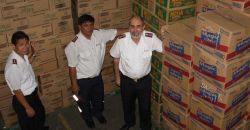Difficult logistics for Philippines typhoon relief

Colonel Wayne Maxwell, Lt. Colonel Alex Genabe Secretary for Program, and Major Reynaldo Magat at the SM warehouse in Manila with employees preparing 7 tonnes of food for dispatch to Tacloban. (Photo courtesy of The Salvation Army IHQ)
The Salvation Army has launched a Disaster Relief Appeal to assist communities in the Philippines devastated by the fiercest typhoon to have ever made landfall.
Typhoon Haiyan has left thousands missing and feared dead, with bodies lying throughout the streets. The Salvation Army in the Philippines has already released resources to purchase water, food and medical supplies.
Territorial Commander for the Philippines Colonel Wayne Maxwell, an Australian, told ABC NewsRadio yesterday the largest issue facing the stricken nation is the logistics of getting relief services to those affected.
“I think it has just taken our nation by surprise. The magnitude of the damage is just something that, while they were expecting a large typhoon, was not like anything they had envisaged.”
They have been told power will not be reconnected for 12 months in some places, and there is no cell network coverage. These conditions mean there is no way for those in the disaster zone to communicate what they need. For now, agencies are dealing with basic things, such as clearing debris, gaining access to roads and maintaining order.
The Salvation Army is trying to procure a plane to get seven tonnes of food to Tacloban, one of areas hardest hit by the disaster.
“They utilise natural available products they can gain access to. But the reality is they are running out of food, and in many places they have run out of food and are waiting and starving for assistance,” says Colonel Maxwell.
On Tuesday, another tropical weather system hit the Philippines, bringing rain and winds of up to 60km/hr. These conditions only hinder the recovery process.
Donations to support The Salvation Army's response in The Philippines can be made through local Salvation Army offices or online at www.salvationarmy.org.
Comments
No comments yet - be the first.